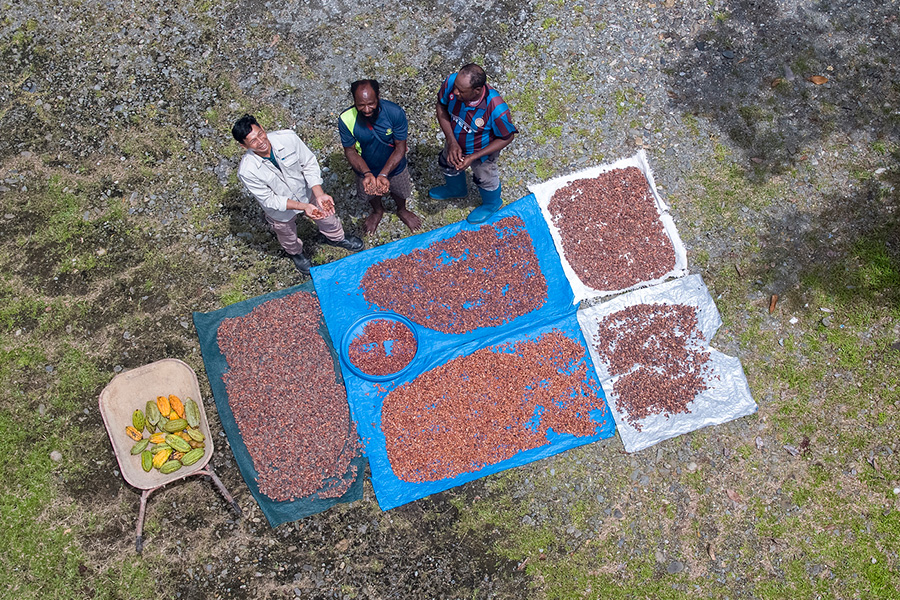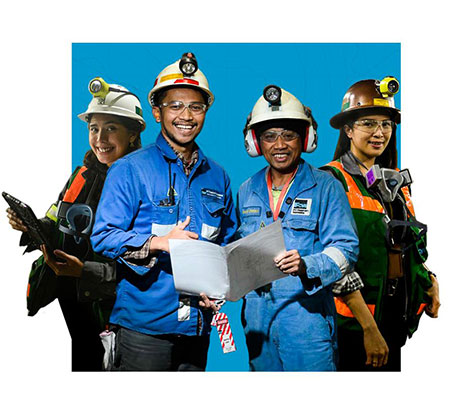09 April 2022

When PT Freeport Indonesia mine is no longer operating, the community can have income from cocoa plantations. The new source of income is sought through cooperatives. If one day the mine no longer exists, chocolate (cocoa) will become something important, said Devia Mom as if prophesying, on Saturday, 19th March 2022, in a cocoa plantation in Utikini Two Village, Kuala Kencana District, Mimika Regency, Papua. That's why they give the seeds free to the community, Devia said.
In the last ten years, Devia, a native Papuan man who is firm in his words and demeanor, has led a cooperative called Buah Dewa. The name was chosen to promote cocoa as a fruit with great economic value. Devia believes that cocoa will be a source of people's welfare as well as a spur for Mimika's new economic growth to replace gold, silver and copper from the PT Freeport Indonesia (PTFI) mine, at least 19 years from now. In 2041, PTFI's special mining license expires.
If it is not extended, PTFI, which has operated for half a century in Mimika, will leave. This situation is not good news because PTFI is the biggest contributor to Mimika's gross regional domestic product (PDRB). According to a study by the Institute for Economic and Community Research, University of Indonesia, PT Freeport Indonesia's activities made up 67.7 percent of Mimika's PDRB in 2018. Its contribution was 91 percent in 2013.
PTFI also helps a lot through various social programs for Mimika residents. However, Devia said that the existence of the mine has also encouraged many residents to become gold miners in Kali Kabur, a river that drains mining waste. A day, every miners can get Rp 500,000-Rp 1 million from several grams of gold. This is the reason cocoa is not much in demand. However, the Buah Dewa Cooperative (KBD), which was established in 2012 as a lowland agriculture program in the PTFI Community Affairs Division, continues to exist and provides a safer alternative source of income.
Devia said KBD now has 300 active members from the 500 registered members. The majority of KBD members are indigenous Papuans from ethnic minorities in Mimika, such as Dani, Damai, Moni, Mee, and Nduga who live in the Kuala Kencana District of East Mimika. Until 2020, the total cocoa land for KBD members is 228 hectares. Anyone can become a member and the only requirement is to have plantation land. Cocoa seeds can be obtained free of charge from the cooperative, regardless of the amount. Members also receive fertilizer and small farming tools.
They can sell their crops to KBD. The cooperative acts as an intermediary between farmers and industries that use cocoa beans. Now, KBD has a sale and purchase contract with PT Cargill Indonesia in East Java and PT Mars Symbioscience Indonesia in South Sulawesi which is export-oriented.
If the weather is good, rain and heat are balanced, every six months it can produce three tons (dry cocoa beans) sent to the factory. The cooperative makes a profit of Rp. 5,000 per kilogram. If the factory can buy Rp. 30,000 per kg, then they buy it from the community for Rp. 25,000 per kg. So, it is not fixed but adjusts the price from the factory, said Devia.
Because market access is guaranteed, cocoa brings prosperity. The person in charge of the cocoa plantation program from PTFI Community Affairs, Sem Kabuare said that the current arrangement is in line with the company's goal, which is to grow other economic sectors so that the community is independent.
His party are trying to develop cocoa with the hope that in the period of post-mining, when the Freeport mine is no longer operating, the community can have income from cocoa plantations. The prospect of cocoa is good because the price is determined by the world market, said Sem. In addition, the cacao tree will continue to bear fruit for three years after the seeds are planted without cultivation and complicated care. Farmers also have a constant income.
Challenge
However, this does not mean that the cocoa plantation program is without problems. Devia also admits that cocoa alone has not been able to bring benefits to KBD. The current production capacity, three tons of dry cocoa beans every six months, is still too small. In fact, said Sem, it should be able to harvest and send cocoa beans every month. One of the reasons farmers are less enthusiastic is the long waiting period for the trees to bear fruit, which is three years. Heavy rainfall around Timika causes cacao pods to fall.
The solution, KBD accompanies the cocoa program with food crops. Members are encouraged to plant sweet potatoes, taro, and bananas that will be absorbed by KBD, then sold to PT Pangansari Utama, a PTFI catering contractor that serves 6,329 direct employees of PTFI and 25,875 employees of PTFI's partner companies every day. So, everyday they (farmers) can have income while waiting for cocoa production. We will help open market access so that other commodities planted by the community can be absorbed, said Sem.
The impact of Devia's food crop program is very good. The farmers had queued at the cooperative plantation area to sell their crops. Since then, KBD has made a sales schedule for each village, so that the sweet potatoes, taro and bananas purchased do not pile up.
Sem said that every year KBD earns Rp 1.2 billion-Rp 1.3 billion. He did not hesitate to say that KBD is independent in financing its activities. One of the benchmarks is that PTFI does not provide subsidies to KBD so that it can pay its members.
The benefits of KBD are felt, one of them is by Jones Wenda (59), a man pf Dani Tribe from the Ilaga mountain area in Puncak Regency. After coming down to Timika and becoming a member of the KBD, he can earn Rp. 3.3 million every month from the sale of cocoa and food crops. With seeds, fertilizers, and simple farming tools from the cooperative, his life slowly improved economically. Dani said that the sales can help his party be more affluent.
Apart from that, Devia is well aware that the food crop program could end if PTFI stops operating. There will be no more thousands of employees consuming sweet potatoes, taro, and bananas. Cocoa is a long-term project. Head of the Mimika Food Crops, Horticulture and Plantation Service Alice Wanma said in writing that the government and PT Freeport Indonesia agreed to expand cocoa land to 100 hectares in 2022-2024.
Kami menghimbau para pencari kerja untuk berhati-hati dan mewaspadai beragam modus penipuan perekrutan yang mengatasnamakan PT Freeport Indonesia. Dalam setiap proses rekrutmen dan penerimaan karyawan, PT Freeport Indonesia maupun konsultan rekruitmennya tidak memungut biaya apapun.
Untuk melihat lowongan, silakan akses melalui link berikut: ptfi e-recruitment
Untuk melihat informasi magang, silakan akses melalui link berikut: Internship Program
